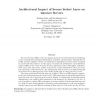Free Online Productivity Tools
i2Speak
i2Symbol
i2OCR
iTex2Img
iWeb2Print
iWeb2Shot
i2Type
iPdf2Split
iPdf2Merge
i2Bopomofo
i2Arabic
i2Style
i2Image
i2PDF
iLatex2Rtf
Sci2ools
114
click to vote
ICCD
2000
IEEE
2000
IEEE
Architectural Impact of Secure Socket Layer on Internet Servers
Secure socket layer
SSL
is the most popular protocol used in the Internet for facilitating secure communications through authentication, encryption, and decryption. Although the use of SSL provides adequate security, the performance degradation has been drastic compared to non-secured data retrieval. In this paper, we analyze the performance and architectural impact of SSL on the servers in terms of various parameters such as throughput, utilization, cache sizes, cache miss ratios, number of processors, control dependencies, le access sizes, bus transactions, network load, etc. The experimental study is based on an Intel Pentium III Xeon based server; although many of the results should apply to other processors as well. The major conclusions from this study are as follows: The use of SSL increases computational cost of the transactions by a factor of 5-7. SSL transactions do not bene t much from a larger L2 cache, but a larger L1 cache would be helpful. A complex logic for handling...
Related Content
| Added | 16 Mar 2010 |
| Updated | 16 Mar 2010 |
| Type | Conference |
| Year | 2000 |
| Where | ICCD |
| Authors | Krishna Kant, Ravishankar K. Iyer, Prasant Mohapatra |
Comments (0)

